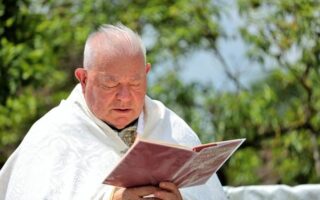In this article we will face an interesting question: Did Buddha predict Jesus Christ and what is the evidence? We have looked at the main points and look at them through the lens of Christians and the Bible.
We have looked at the 7 most important evidences and we can say for sure that Buddha could not have meant Jesus – if the prophecy was transmitted without errors at all.
Buddha can also be other persons in Buddhism, but in the language use and in the claim to be examined this is not the case. Therefore: If we speak here of “Buddha”, then we mean Siddhartha Gautama, the founder of Buddhism.
Table of Contents
Proof #1: Metteyya means Messiahs
Buddha is said to have uttered a prophecy that someday a world teacher will come. This teacher is the Metteyya. The claimants that Buddha announced Jesus now say that Metteyya is a word for “Messiah.” They claim that the Hebrew word “Masiha” corresponds to the corresponding word “Metteyya” in the Pali language.
What is to be said to this? It is always bad to argue with the sounds of words. Because just because a word sounds similar, it does not necessarily mean the same thing. But other problems arise with this assumption.
In Hebrew, the word would more likely be written as mashiach or moshiach. In Greek, Christós, or by Latin, “Christ.” Neither of these words even sound similar enough for one to seriously determine a commonality.
That “masiha” means Messiah, however, is true. However, it is purely a term used only in Judaism and Christianity and has no meaning in Buddhism.
Proof #2: The prophecy of Buddha was fulfilled
Buddha pronounced the prophecy and the following things had to be fulfilled in order to fulfill the prophecy:
The successor was to appear 1000 years after the first Buddha
It is said that Jesus appeared in India about 500 AD. Assuming that this is true (although there is already quite little evidence for this, as we shall see), at least two problems arise:
- a) This would be Jesus second coming and would contradict the Bible.
- b) If the successor should appear only 1000 years after the first Buddha – Why was Jesus the first time and taught (allegedly) the same as later with the Buddhists?
The fulfillment of the prophecy in that case is not as clean as some hope.
The 1000 years are not fixed
One problem with prophecy is this: Even within Buddhism, people are not sure if it is really 1000 years. There are teachings that assume 3000 or even 30000 years. So whoever believes himself because of the prophecy because of the 1000 years is putting the cart before the horse.
The prophecy was not fulfilled
The time of the prophecy cannot have been fulfilled. This is because the following condition was not fulfilled: People should be 80000 years old at the time of the coming (again). The oldest man was 127 years old. That is not even close.
Evidence #3: Same honorific titles
As proof that Buddha influenced Jesus or that Jesus absorbed things from Buddhism, it is considered that Jesus gave himself some titles that are so known from Buddha. This is taken as proof that Buddha indirectly announced Jesus.
Jesus calls himself “the light” and Buddha also calls himself “the light”. The saying of Jesus that he is light alludes to Isaiah 42:6, in which Jesus becomes the light of the nations. The Isaiah scroll was written about 700 BC. Buddha worked about 300 years later. That Jesus is alluding to Buddha is not true.
Jesus was called “Master” and Buddha was called Master. False. Jesus was not called Master, In Matthew 23:8 he rejects this designation for himself (as well as the designation “Rabbi”) and refers to the fact that only God is Master. Whereby the word can also be translated as “teacher” at this point. (The man Jesus submits to this principle even though he is God).
Jesus is said to have been called a “prince,” as Buddha was a prince. The Bible gives no place where Jesus is called a prince. His claim to be the sole ruler makes Jesus directly a king. However, this is a very different kind of king that Buddha never was.
Often paraphrases are still thrown in for both that are so woolly that they would fit anything. Many would even fit Mohammed. Therefore, they are not really conclusive.
Proof #4: Jesus did not have a father when he was born….
…just like Buddha, so it is basically the same person. Obviously, this is not true. According to the Gospels, Jesus was born in a stable and Joseph, the earthly father, was there. Otherwise, we can assume that the heavenly father (God) was definitely there.
Proof #5: Contents of the teachings
Allegedly, certain teachings were transferred to Buddhism after Jesus was in India, respectively some teachings from Buddhism can be found in Christianity.
Once again, there is only one problem: Those who argue in this way are cherry-picking and not looking at the whole tree. Jesus clearly presents himself in the Gospels as the Messiah who will die for the sins of man and at the same time claims to be God.
The problem with this proof begins in the fact that Buddhism does not give a God at all. Thus, there is no sin against Him, and thus the Messiah is not really necessary. All of Jesus’ teachings center on the relationship between man and God and how the latter fails in the face of God’s requirement.
So the teachings of Buddha and Jesus do not even have the same background.
(Missing) Evidence #6: Writings about the Life of Buddha
There are no reliable writings about the life of Buddha. These were written down only many hundreds of years after Buddha was dead and there could be no living witnesses and all transmissions were only hearsay. The story of Jesus (the Gospels) probably circulated in writing among believers only a few years after his death and could be corrected by contemporary witnesses. Scientists can trace the Bible texts almost without gaps back to the beginning and confirm that there are no major changes (there are just spelling mistakes).
With Buddha obvious changes were made. So something appears there that seems like the Sermon on the Mount… However, it is more likely that the monks were “inspired” by the Gospels than the other way around.
Proof #7: Jesus was white
The prophecy claims that a white person will occupy or take the position as Metteyya. This is said to have been fulfilled by the fact that Jesus was white and came from a foreign land.
That Jesus had a white skin color is simply not true. His skin color would have been more brown-tan to black. Thus he would have a similar skin color as the Indians and thus not really whiter, than the monks.
Did Buddha predict Jesus?
Who looks at these alleged proofs, will see: Jesus is quite not the fulfillment of the prophecy. The evidence is too weak for that… which already starts with the fact that a forgery is quite probable. (Proof 6) Besides, it would contradict Christianity that when Jesus would come again, nothing would happen but that he would appear somewhere in Egypt in a monastery.


